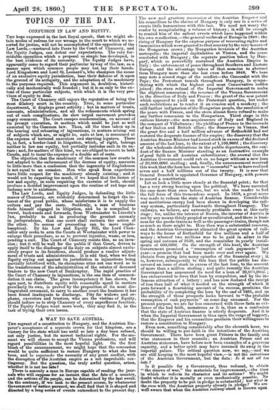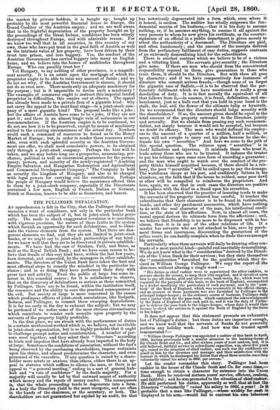A WAY TO SAVE AUSTRIA.
THE regrant of a constitution to Hungary, and the Austrian Em- peror's acceptance of a separate crown for that kingdom, are a victory for the state which has until so late a day been refused, not only justice, but its merest technical rights. For the mo- ment we will choose to accept the Vienna professions, and will regard possibilities in the most hopeful light. On the first blush of the announcement, we might hope that the concession would be quite sufficient to restore Hungary to what she has been, and to supersede the necessity of any great conflict, with the disruption of the Austrian empire as a not improbable con- tingency. But the question, the truly awful question, arises, whether it is not too late ?
There is scarcely a man in Europe capable of reading the jour- nals who will suppose for an instant that the fate of a country, and the actions of its people, can be determined by the last event. On the contrary, if we look to the present course, by whatsoever Government or nation pursued, we shall find that it is shaped and directed by a long series of events antecedent to the present day. The new and gracious concession of the Austrian Emperor and his eouncillors to the claims of Hungary is only ene in a series of events little harmonious with this last. We need not weary the reader by recapitulating a volume of history ; it, will be enough to remind him of the salient events which have happened within his own recollection,—the general outbreak of Europe in 1848 ; the rising of Hungary for the express purpose of recovering rights and immunities which were granted to that country' by the very tenure of the Hungarian crown ; the Hungarian invasion of the Austrian metropolis ; the imperial capitulation at Vienna, and the peace concluded with Hungary ; the separate position taken byfiuu- garY, which so powerfully sustained the Austrian lire
mpi in Italy ; the enforcement of peace throughout Southern and Eastern Europe, and the advantage taken of that occasion to abstract from Hungary more than she lost even before 1848. We here may note a second stage of the conflict—the Cnneevelat with the Pope; the Protestant tumult throughout. Hungary, in sympa- thizing with which the highest and most Conservative noble joined ; the stern refusal of the Imperial Government to make the slightest concession ; the reverses of the Vienna Government in the direction of Italy and France ; the grant of the new patent which appeared to yield on the Protestant question, but under such restrictions as to render it an evasion and a mockery ; the still further indignation of the Hungarian people, the eonelusion of the peace with France, and the stern almost fierce refusal to make any further concession to the Hungarians. Third stage in this curious history—the non-acquiescence of Italy and England in the compact of Villafranca ; the yielding of Prance to the counsels of her Italian and British allies ; the discovery in Vienna, that the great five and a half million advance of Rothschild had not restored the desperate finance of the empire; the discovery that the Austrian finance Minister had issued stock in excess of the declared amount of the last loan, to the extent of 1,100,0004. ; the diseovery of the wholesale defalcations in the public departments, the con- duct of the finance Minister standing as an instructive example of good faith to all Austrian subordinates ; the avowal that the Austrian Government could rub on no longer without a new loan of 20,000,0001. sterling; and, finally, the announcement received this week that the loan has been so " successful" as to have realized seven and a half millions out of the twenty. It is now that General Benedek is appointed Governor of Hungary, with powers to accord a constitution.
Let us look a little more closely at the finaneial point; for that has a very strong bearing upon the political. We have narrated the case more than once before, but we wish the reader to feel the full force of this tremendous sequel. In 1858, a great move was made to redeem the state of Austrian finance. Considerable and meritorious energy had been shown in developing the rail- way system, particularly Eastwards throughout Hungary. The railways, we believe, are extremely profitable even at this early stage ; for, unlike the interior of Russia, the interior of Austria is not by any means thinly peopled or uncultivated, and there is busi- ness for the goods-trains as well ea the passenger-trains, though not so much as there might be. Here then was a substantial resource, and the Austrian Government alienated the great system of rail- ways to the house of Rothschild for five millions and a half of money ; whereof two millions was to be paid in silver in the spring and autumn of 1859, and the remainder in yearly instal- ments of 600,0001. On the strength of this haul, the Austrian Government promised a "resumption of cash payments" last year—a promise that had been made over and over again. Wo abstain from going into many episodes of the financial story ; it is, however, subsequently to this loan that the public has dis- covered an issue of stock in excess of the last loan, to the amount of more than a million sterling ; and quite recently the Austrian Government has announced its need for a loan of 20,000,0001. ; has endeavoured to force that loan by compulsion, and by the in- famous attraction of a lottery ; and has now declared the receipt of less than half of what it needed on the strength of which it puts forward a flourishing account of its success, proclaims the probability of its completing the loan by the and of 1861, and on the strength of those prospects looks forward to "the probable resumption of cash payments" on some day unnamed. For the present purpose, we are far less concerned with these facts as evi- dence of the bad faith, monstrous as it is, than as a confession that the state of Austrian finance is utterly desperate. And it is when the Imperial Government is thus upon the verge of beggary, that the Emperor and his counsellors proclaim their willingness to restore a constitution to Hungary. Even now, something considerably after the eleventh hour, we should be willing to put faith in the intentions of the Austrian Government. There have been great Princes in the family and wise statesmen in their councils ; an Austrian Prince and an Austrian statesman, have before now been examples of a generous sagacity, and a better spirit may have resumed its sway in the imperial palace. The critical question now, we say,—and we are still keeping to the most hopeful view,—is not the intentions of the Austrian Government, but the date : Is it not all too late r Is it possible for a Government, thus reduced, to obtain " the sinews of war," the materials for improvement,—the time in which to redeem its character and its actions ? We might doubt whether it is morally or even mechanically possible. 1'4,10 doubt the property to be put in pledge is substantial ; but what is the case with the Austrian property already in pledge? We are well aware that when the Austrian railway-stock is thrown upon
the market by private holders, it is bought up ; bought up probably by the most powerful financial house in Europe, the Grand Creditor of the Austrian empire ; and we are well aware that in the frightful depreciation of the property brought on by the proceedings of the Great Debtor, confidence has been utterly destroyed throughout Europe, and with admirable reason. For we know too well that in all countries, in this country of our own, those who have put trust in the good faith of Austria as well as the intrinsic value of her property, have been driven by their trust into prison, and into beggary. Yes, the conduct of the Austrian Government has carried beggary into many an English home, and we believe into the homes of multitudes throughout Europe. Who can possibly trust her ?
Yet Hungary, to say nothing of other provinces, is a magnifi- cent security. It is an estate upon the mortgage of which the proprietor ought to be able to raise any amount of funds ; and we do not see why, if the Austrian Government is sincere, it should not do so even now. There needs only an adequate machinery for the purpose ; but is it impossible to devise such a machinery ? The examples of commerce ought to instruct this imperial landed proprietor in difficulties, this empire out at elbows. The appeal has already been made lo a private firm of a gigantic kind : why not carry the appeal to the next final stage—to a joint-stock com- pany of a more gigantic kind ? The proposal looks like a joke ; but the affairs of Austria have come to be a joke, if they are not past it; and there is an almost tragic vein of seriousness in our recommendation. If the Austrian empire is to be continued, we do not see how it is to be preserved, except by means of machinery suited to the existing circumstances of the actual day. Nowhere could such a command of resources be found as in the Money Market of Europe ; but, in order to render those resources avail- able, even with such splendid security as the Austrian Govern- ment can offer, we shall need cumulative powers' to be obtained only through a joint-stock company. Perhaps the hint will be taken, and we may before long see a prospectus, announcing, per- chance, political as well as economical guarantees for the perma- nency, powers, and security of the newly-registered " Austrian Empire Salvation and Hungarian Redemption and Agricultural and Commercial Development Company." The Company to hold as security the kingdom of Hungary, and also to be charged with legal powers for carrying out the constitution. Perhaps the people of Hungary would believe the assurances offered thus to them by a joint-stock company, especially if the Directorate contained a few men, English or French, Italian or German, Dutch or Russian, known to be able as financiers, and honest.



























 Previous page
Previous page